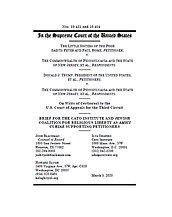Learn more about Cato’s Amicus Briefs Program.
The Supreme Court said in Burwell v. Hobby Lobby (2014) that, under the Religious Freedom Restoration Act, the Department of Health and Human Services (HHS) could not apply its contraceptive mandate to closely held for‐profit corporations when doing so would violate the owners’ sincere religious beliefs. Around the time of that decision, the Court stayed the application of the mandate to nonprofits, including a group of nuns known as the Little Sisters of the Poor. The Little Sisters and their co‐plaintiffs in Zubik v. Burwell (2016) objected to the “accommodation” that HHS crafted for religious nonprofits because they considered it to require them to be complicit in sin. While the Supreme Court stopped the operation of the contraceptive mandate against the Little Sisters in light of Hobby Lobby, their case is still active.
Here’s the deal: Although the Affordable Care Act said nothing about accommodating or exempting religious organizations from the requirement of providing employees “preventive care” (a term undefined in the statute’s text), HHS issued a rule that exempted churches and their “integrated auxiliaries” from the mandate altogether but required other religious organizations to submit a self‐certification that would lead insurers or third‐party administrators to cover the cost of the objectionable contraceptives.
In doing so, the department claimed to try to balance religious liberty and access to contraceptives by exempting churches and accommodating other religious employers. It justified this distinction by saying that non‐church religious employers were “more likely” to employ people who did not share their faith or adhere to the same objection. That distinction did not and does not hold up, however, as the Little Sisters continue to maintain that the mere “accommodation” makes them violate their sincerely held religious beliefs.
In November, Cato and the Jewish Coalition for Religious Liberty filed an amicus brief that urged the Supreme Court to resolve the same question Cato asked the Court to resolve in Zubik: Whether HHS and other federal departments have the interpretive authority to craft a religious “accommodation” pursuant to the ACA’s “preventive care” mandate. The answer, both then and now, is no. The Supreme Court granted to review the case. Now, Cato and the Jewish Coalition for Religious Liberty has filed a brief in support of the Little Sisters of the Poor, as well as the federal government. The Court will hear arguments on April 29, 2020.
First, the accommodation—third-party coverage of “preventive care” upon self‐certification of a belief‐based objection—was crafted without any statutory anchor. There is no indication in the ACA’s 900+ pages that Congress intended for HHS to make religion‐related judgment calls; the word “religion” does not even appear anywhere. It is particularly unlikely that Congress would have delegated, without any statutory guidance, this sort of authority, given that the relevant agencies have no expertise in crafting religious accommodations. Executive agencies simply cannot impose arbitrary burdens on religious non‐profits that they guesstimate to be “less” religious than churches. Second, the departments lack the “expertise” to answer this “major question” of social, “economic and political consequence,” to quote King v. Burwell (the 2015 statutory challenge to Obamacare), and are not entitled to make religious‐liberty policy or receive judicial deference when they do.
Unfortunately, the Supreme Court in Zubik did not decide whether the post‐Hobby Lobby regulations were the least restrictive means of serving the government’s interest in the “preventive care” provision, remanding the case—and the 800‐pound religious‐liberty gorilla—to the lower courts. Now the case has returned to the Court’s marble steps, offering the justices another chance to provide the Little Sisters and similarly situated groups real protection. This is the only way to remedy the substantial burden placed on their free exercise of religion, imposed on them by dint of their organizational form and other agency‐contrived criteria.

This work is licensed under a Creative Commons Attribution-NonCommercial-ShareAlike 4.0 International License.
